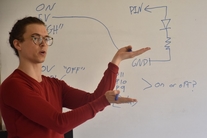Lunch and Learn About Engineering Education and Sustainable Technology in Developing Countries
We are hosting Harry Pigot, a UBC alumnus, who founded an engineering education program in Nepal. This model is self-sustaining by employing peer-to-peer learning among children in low resource environments. We are also pleased to have Matthieu Amyotte, the co-advisor of the Sustaingineering team at the University of British Columbia (UBC). He will talk about the mission of the team to develop and deploy sustainable technology in remote and developing communities.
Date and Time
Location
Hosts
Registration
-
 Add Event to Calendar
Add Event to Calendar
- 2356 Main Mall
- Vancouver, British Columbia
- Canada V6T 1Z4
- Building: MacLeod Building
- Room Number: 418
Speakers
 Harry Pigot of The University of British Columbia
Harry Pigot of The University of British Columbia
A Self-Sustaining Model for Peer-to-Peer Engineering Education Among Children in Low Resource Environments
Engineering education among children has the potential to spark their interest in technical subjects, overcome gender imbalances within the field, and empower young people with the tools to make positive changes in their communities. However, it can be difficult to integrate into existing school curricula, especially when resources are constrained.
Here I present a one-year case study conducted in Nepal where I formed a student-led electronics and programming club for children aged 10-16. The club model uses hands-on peer-to-peer teaching and open-source activity documentation. This approach allows the club to sustain itself and scale up without the need for continuous teacher involvement. The documented club activities are low-cost, further lowering barriers for implementation. In total, over 100 hours of activities were conducted. Today, the students independently run 3 hours of activities each week, teaching their peers basic programming, electronics, and engineering design concepts.
Biography:
Henry (Harry) Pigot is a UBC Electrical Engineering alumni developing machines for heart and lung transplant surgery in southern Sweden. Specifically, he is focused on organ preservation, transportation, and evaluation. Harry works closely with the Lund University Department of Automatic Control and is interested in hands-on engineering education.
www.harrypigot.com
 Matthieu Amyotte of The University of British Columbia
Matthieu Amyotte of The University of British Columbia
Sustaingineering - Developing Student Talent and Sustainable Technology
Sustaingineering is a student team that designs, develops and deploys sustainable technology solutions for renewable energy applications in remote and developing communities. They are currently engaged in multiple projects, locally and internationally, from disaster-preparedness in Vancouver to solar water pumping in Nicaragua and solar-powered homes in Mexico. By adopting an interdisciplinary approach, Sustaingineering brings together students from multiple engineering disciplines and different faculties to tackle real-world problems. This talk will provide an overview of how the team is developing the next generation of leaders while having a meaningful impact in the communities they serve.
Biography:
Matt Amyotte received his Bachelor of Science in Engineering Physics from the University of Alberta in Edmonton, Alberta in 2013. Following nearly 3 years of work experience in the oil and gas industry, he decided to shift his career focus to renewable energy and sustainable technology. This led him to pursue his Master of Applied Science in Electrical and Computer Engineering at the University of British Columbia in Vancouver, Canada, where he is the Graduate Advisor to the Sustaingineering team. He believes hands-on projects with real-world impact provide the best learning opportunities and strives to inspire environmental consciousness in the next generation of engineers.

